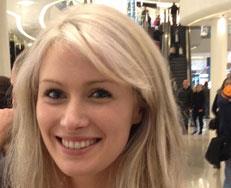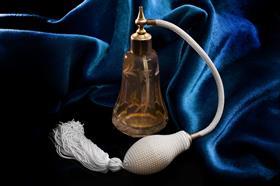Sophie helps improve and perfect fragrances created by perfumers
What is a fine fragrance evaluator?
A fine fragrance evaluator, or a ‘nose’, helps to improve and perfect a fragrance created by the perfumer, who is an expert on creating perfumes, for the consumer, the person who will be ultimately using the perfume. We act as the bridge between the day-to-day desires of the consumer and the technical ability of the perfumer. My role is quite dynamic and involves splitting my time between the office and the evaluation room.

What do you do in your job?
My day usually starts with creative evaluations with a group of other fine fragrance evaluators, providing feedback to the perfumers for new ideas. Later, I usually perform more technical evaluations, providing advice on different fragrance samples that are being tested for stability, or reworked and altered products.
Between evaluations, I am either analysing test data or preparing presentation material for an educational event. The role of a fine fragrance evaluator involves a lot of travel, particularly to Paris, Grasse and Cologne – the origins of perfumery.
What do you enjoy most about your job?
Discovering and expressing the unspoken wishes of the consumer and finding a way to merge it with the mastery of the perfumer is really exciting. This is where science meets creativity and the magic happens!
What attracted you to becoming a fine fragrance evaluator?
I dreamed of working as a beauty therapist when I was growing up. I enjoyed being creative with different beauty products and got a lot of pleasure observing the (mostly positive!) physical and mood transformations of my volunteers after a treatment.
As I grew older, I found that chemistry and biology came quite naturally to me, and it didn’t take long before I realised I wanted to find a way to study them together at university. Pharmacology appealed as a perfect combination of the two disciplines. Later in life, through my cosmetic science degree and by learning about perfumery, I was able to tie in my original love of being creative with different beauty products with science.
How did you get into your job?
I went to high school in Edinburgh where I completed final year Advanced Highers in chemistry, biology and maths with a focus on statistical analysis. My favourite subjects being chemistry and biology, I decided to enrol in the pharmacology BSc Hons course at Edinburgh University, graduating in 2007. As my studies progressed I became more and more interested in transdermal drug delivery mechanisms; this is where a drug is administered across the skin.
Keen to learn more about the skin, I then registered for the cosmetic science BSc Hons at the London College of Fashion, studying aspects of skincare, hair care and fragrances. As my studies drew to a close, one of our visiting Procter & Gamble lecturers, Dr Paul Matts, encouraged me to apply for a role with the company. In 2011 I was offered the position of fine fragrance evaluator at P&G – a role which is as creative as it is scientific.

What are the opportunities for career progression?
The category is quite niche and most fine fragrance evaluators feel so passionate that they tend to stay in evaluation for the whole of their careers. Many different options for evaluation exist outside of fine perfumes; fragrances feature in most toiletries, cleaning products and laundry care for instance. The industry is also closely linked to food flavours, so it is possible to transition from one field to the other.
My personal interests remain fine-fragrance focused. In the two and a half years that I have been evaluating, I have only just scratched the surface of what there is to know about the sense of smell, which is also known as olfaction, plus the field is continuously evolving. This is what I love about my job: the opportunity to learn will never stop.
What advice would you give for people wishing to enter your career area?
To work in the perfume industry, you really have to make time to stop and properly appreciate the individual scents of food, nature and perfumes. It’s also important to keep up to date with the latest scientific developments and consumer trends. The neuroscience, perfumery and raw material chemistry modules from my studies have directly influenced my role as a fine fragrance evaluator. I do think that broad learning across several scientific domains can be extremely powerful when working with chemistry, as it enables you to gain a deeper understanding of detailed processes and their significance in the bigger picture.
To be an evaluator, not only is a keen interest in science absolutely vital, but also the ability to be imaginative. Years of being trained to think scientifically enhances logical and analytical skills, but often at the cost of artistic imagination. Reawakening your creative flair can be as simple as reading a fictional story or stopping to really appreciate the flavours of the food you are eating. To get ahead, this learning needs to be a passion and not a chore.
First published 2014













